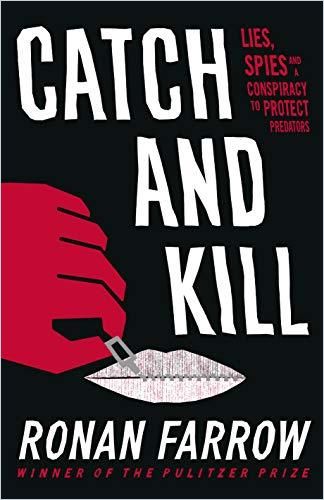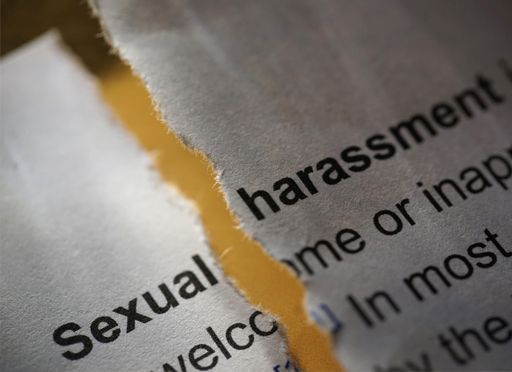Ronan Farrow’s Pulitzer Prize-winning reporting reveals Harvey Weinstein’s harassment of women and the corrupt tactics he – and some news outlets – used to suppress the truth.

Weinstein Caught
Investigative journalist Ronan Farrow – former anchor and investigative reporter for NBC News and reporter for The Wall Street Journal – details in this New York Times bestseller how he tracked the abuse allegations surrounding Harvey Weinstein and dealt with media and private surveillance efforts to kill his story.
Since the establishment of the first studios, few movie executives had been as dominant, or as domineering, as…Harvey Weinstein. Ronan Farrow
Farrow’s revelations, including horrifying narratives of harassment, prove disturbing, as does his chronicle of the cowardice or collusion of news outlets. Farrow tells how Weinstein used economic and political power to sabotage women and reporters. When NBC refused to pursue this story, The New Yorker published it, winning Farrow a Pulitzer Prize.
Bullying and Sexual Harassment
Winning actors and directors at film and television award ceremonies frequently thanked producer Harvey Weinstein – an imposing figure with a dominant personality.
Harvey and his brother Bob launched the film production studio Miramax, which Disney bought in the 1990s. When that relationship soured in the 2000s, the brothers raised millions to launch the Weinstein Company. Their Oscar-winning films include The King’s Speech (2010) and The Artist (2011).
There were stories, mostly whispers, of a darker kind of violence against women, and of efforts to keep his victims quiet.Ronan Farrow
Miramax kept cash on hand to cover up Harvey Weinstein’s bullying, abuse and harassment of women. Eventually, 16 former and current employees acknowledged Weinstein’s sexual predation and his related use of company resources to silence his victims.
Elusive Target
Farrow recounts that New Yorker reporter Ken Auletta learned of two women who worked for Miramax in London and who settled a joint sexual harassment case and received a Weinstein personal check. Weinstein denied it. New York Magazine later decided its possible article wasn’t worth Weinstein’s potential retaliatory behavior.
[Rose McGowan] talked unflinchingly and far more specifically than in her tweets about her allegation that Weinstein had raped her.Ronan Farrow
Actress Rose McGowan lost her Amazon Studios contract after she told the studio head Weinstein had raped her. She was forthright about the incident and believed someone was following her.
A private detective confirmed that investigating Weinstein had triggered surveillance of Farrow himself.
Nine Women
Among the episodes reported, model Ambra Gutierrez told police Weinstein had groped her in March 2015. She wore a wire at her next meeting with him. The police believed her but District Attorney Cyrus Vance Jr.’s office dropped the case. Weinstein and his team made significant political donations, including to Vance’s re-election. The press claimed Gutierrez worked as a prostitute, and printed pictures of her wearing a bikini. What Farrow describes as “slut shaming,” proved an effective tactic. Her lawyers told Gutierrez to settle.
Annabella Sciorra described how Weinstein followed her home, forced himself into her apartment, pushed her onto the bed and raped her. Rumors spread that she was difficult to work with, and no one hired her from 1992 to 1995.
Rosanna Arquette went to Weinstein’s room, where he pulled her hand toward his crotch. Weinstein cautioned her that rejecting him was a mistake. Arquette’s career suffered afterward.
Farrow writes of these episodes with compassion and never sensationalizes what went on. His restraint and empathy add greatly to his reporting.
The National Enquirer
American Media, Inc. (AMI), which owns The National Enquirer, reported and published negative stories about anyone who accused Weinstein. After AMI and Weinstein signed a production deal in 2015, Weinstein leaned on AMI to “catch and kill” any negative accounts.
The National Enquirer was a tabloid sewer, a place to which much of America’s ugly gossip eventually flowed. When stories were abandoned or successfully buried at the behest of AMI’s friends in high places, they came to rest in the Enquirer’s archives, in what some staff called ‘kill files’.Ronan Farrow
AMI bought and killed stories about Arnold Schwarzenegger, Sylvester Stallone, Tiger Woods and Donald Trump. However, it published embarrassing or injurious stories that discredited their accusers. The Associated Press exposed the Enquirer’s misbehavior.
Black Cube
Weinstein hired K2 Intelligence to investigate Ambra Gutierrez and also retained the NSO Group, known for its Pegasus software, which could control a cellphone and extract its data. He also contracted Black Cube, which hired a woman to befriend McGowan and gain access to the book she was writing about Weinstein. Farrow learned the private investigative firm PSOPS gave Weinstein information about him.
That kind of silence isn’t just wrong. It’s dangerous. It sends a message to victims that it’s not worth the anguish of coming forward. It sends a message about who we are as a society, what we’ll overlook, who we’ll ignore, who matters and who doesn’t.Ronan Farrow
An anonymous source gave Farrow information about Black Cube’s work for Weinstein. Farrow illuminates a labyrinth of surveillance corruption and how some operatives, sickened by it, told him the truth.
The New Yorker
During Farrow’s investigations, multiple NBC senior executives suggested or demanded he stop. Some assured Weinstein that Farrow would not pursue the story for NBC.
Network television is a commercial medium. Conversations about the palatability of stories are commonplace. You pick your battles.Ronan Farrow
Employees of NBC described a culture of harassment. Weinstein knew about episodes involving NBC executives, and two sources said he’d threatened Today anchor Matt Lauer with leaked information. Farrow says NBC’s willingness to conceal its executives’ behavior made network leaders susceptible to threats.
The New Yorker editor-in-chief David Remnick accepted Farrow’s article, and the New Yorker’s ace fact-checkers confirmed his reporting. The story went live on October 10, 2017. The magazine received threats from Weinstein’s lawyers. But after the initial story broke, many more women came forward with reports of Weinstein’s sexual harassment.
Pure Reporting
In times when – as investigative journalist Ronan Farrow reports – the truth can be trampled by spin, abuse, money, collusion or power, his work shines as a beacon of uncorrupted reportage. His tale is harrowing, and his descriptions of Weinstein’s assaults are not easy to read or digest. But Farrow’s interest is not prurient. He offers details of sexual assaults to help readers understand the trauma Weinstein’s victims suffered and the bafflement many felt about how to respond to his attacks. Farrow stood up to incredible pressure bringing this story to light. In telling of that pressure, he does not pat himself on the back or offer himself up as a hero. In the best traditions of investigative journalism, Farrow modestly presents himself as a person trying to do his job: Discover and report the truth.
Ronan Farrow also wrote War On Peace. Other reportage on sexual harassment includes She Said by Jodi Kantor and Megan Twohey, Brave by Rose McGowan, and Hollywood Ending by Ken Auletta.





